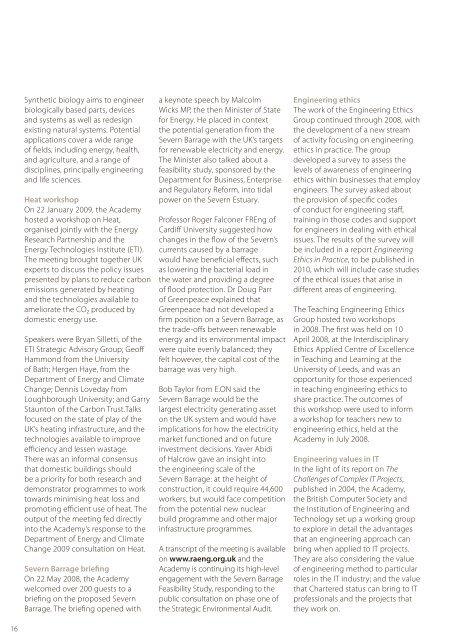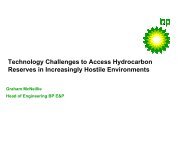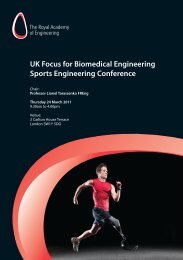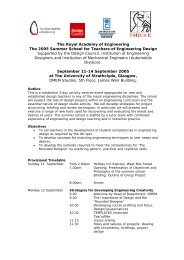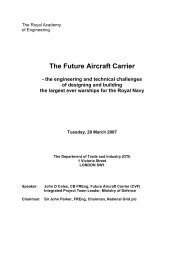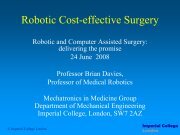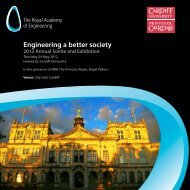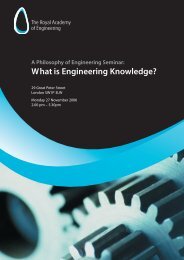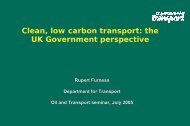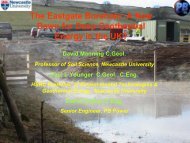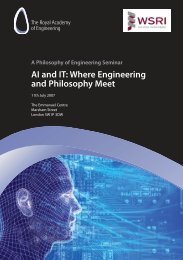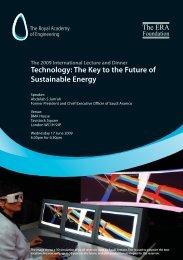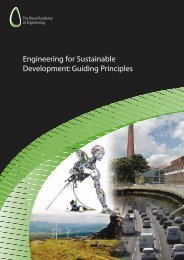Annual Report - Royal Academy of Engineering
Annual Report - Royal Academy of Engineering
Annual Report - Royal Academy of Engineering
Create successful ePaper yourself
Turn your PDF publications into a flip-book with our unique Google optimized e-Paper software.
Synthetic biology aims to engineer<br />
biologically based parts, devices<br />
and systems as well as redesign<br />
existing natural systems. Potential<br />
applications cover a wide range<br />
<strong>of</strong> fields, including energy, health,<br />
and agriculture, and a range <strong>of</strong><br />
disciplines, principally engineering<br />
and life sciences.<br />
Heat workshop<br />
On 22 January 2009, the <strong>Academy</strong><br />
hosted a workshop on Heat,<br />
organised jointly with the Energy<br />
Research Partnership and the<br />
Energy Technologies Institute (ETI).<br />
The meeting brought together UK<br />
experts to discuss the policy issues<br />
presented by plans to reduce carbon<br />
emissions generated by heating<br />
and the technologies available to<br />
ameliorate the CO2 produced by<br />
domestic energy use.<br />
Speakers were Bryan Silletti, <strong>of</strong> the<br />
ETI Strategic Advisory Group; Ge<strong>of</strong>f<br />
Hammond from the University<br />
<strong>of</strong> Bath; Hergen Haye, from the<br />
Department <strong>of</strong> Energy and Climate<br />
Change; Dennis Loveday from<br />
Loughborough University; and Garry<br />
Staunton <strong>of</strong> the Carbon Trust.Talks<br />
focused on the state <strong>of</strong> play <strong>of</strong> the<br />
UK’s heating infrastructure, and the<br />
technologies available to improve<br />
efficiency and lessen wastage.<br />
There was an informal consensus<br />
that domestic buildings should<br />
be a priority for both research and<br />
demonstrator programmes to work<br />
towards minimising heat loss and<br />
promoting efficient use <strong>of</strong> heat. The<br />
output <strong>of</strong> the meeting fed directly<br />
into the <strong>Academy</strong>’s response to the<br />
Department <strong>of</strong> Energy and Climate<br />
Change 2009 consultation on Heat.<br />
Severn Barrage briefing<br />
On 22 May 2008, the <strong>Academy</strong><br />
welcomed over 200 guests to a<br />
briefing on the proposed Severn<br />
Barrage. The briefing opened with<br />
a keynote speech by Malcolm<br />
Wicks MP, the then Minister <strong>of</strong> State<br />
for Energy. He placed in context<br />
the potential generation from the<br />
Severn Barrage with the UK’s targets<br />
for renewable electricity and energy.<br />
The Minister also talked about a<br />
feasibility study, sponsored by the<br />
Department for Business, Enterprise<br />
and Regulatory Reform, into tidal<br />
power on the Severn Estuary.<br />
Pr<strong>of</strong>essor Roger Falconer FREng <strong>of</strong><br />
Cardiff University suggested how<br />
changes in the flow <strong>of</strong> the Severn’s<br />
currents caused by a barrage<br />
would have beneficial effects, such<br />
as lowering the bacterial load in<br />
the water and providing a degree<br />
<strong>of</strong> flood protection. Dr Doug Parr<br />
<strong>of</strong> Greenpeace explained that<br />
Greenpeace had not developed a<br />
firm position on a Severn Barrage, as<br />
the trade-<strong>of</strong>fs between renewable<br />
energy and its environmental impact<br />
were quite evenly balanced; they<br />
felt however, the capital cost <strong>of</strong> the<br />
barrage was very high.<br />
Bob Taylor from E.ON said the<br />
Severn Barrage would be the<br />
largest electricity generating asset<br />
on the UK system and would have<br />
implications for how the electricity<br />
market functioned and on future<br />
investment decisions. Yaver Abidi<br />
<strong>of</strong> Halcrow gave an insight into<br />
the engineering scale <strong>of</strong> the<br />
Severn Barrage: at the height <strong>of</strong><br />
construction, it could require 44,600<br />
workers, but would face competition<br />
from the potential new nuclear<br />
build programme and other major<br />
infrastructure programmes.<br />
A transcript <strong>of</strong> the meeting is available<br />
on www.raeng.org.uk and the<br />
<strong>Academy</strong> is continuing its high-level<br />
engagement with the Severn Barrage<br />
Feasibility Study, responding to the<br />
public consultation on phase one <strong>of</strong><br />
the Strategic Environmental Audit.<br />
<strong>Engineering</strong> ethics<br />
The work <strong>of</strong> the <strong>Engineering</strong> Ethics<br />
Group continued through 2008, with<br />
the development <strong>of</strong> a new stream<br />
<strong>of</strong> activity focusing on engineering<br />
ethics in practice. The group<br />
developed a survey to assess the<br />
levels <strong>of</strong> awareness <strong>of</strong> engineering<br />
ethics within businesses that employ<br />
engineers. The survey asked about<br />
the provision <strong>of</strong> specific codes<br />
<strong>of</strong> conduct for engineering staff,<br />
training in those codes and support<br />
for engineers in dealing with ethical<br />
issues. The results <strong>of</strong> the survey will<br />
be included in a report <strong>Engineering</strong><br />
Ethics in Practice, to be published in<br />
2010, which will include case studies<br />
<strong>of</strong> the ethical issues that arise in<br />
different areas <strong>of</strong> engineering.<br />
The Teaching <strong>Engineering</strong> Ethics<br />
Group hosted two workshops<br />
in 2008. The first was held on 10<br />
April 2008, at the Interdisciplinary<br />
Ethics Applied Centre <strong>of</strong> Excellence<br />
in Teaching and Learning at the<br />
University <strong>of</strong> Leeds, and was an<br />
opportunity for those experienced<br />
in teaching engineering ethics to<br />
share practice. The outcomes <strong>of</strong><br />
this workshop were used to inform<br />
a workshop for teachers new to<br />
engineering ethics, held at the<br />
<strong>Academy</strong> in July 2008.<br />
<strong>Engineering</strong> values in IT<br />
In the light <strong>of</strong> its report on The<br />
Challenges <strong>of</strong> Complex IT Projects,<br />
published in 2004, the <strong>Academy</strong>,<br />
the British Computer Society and<br />
the Institution <strong>of</strong> <strong>Engineering</strong> and<br />
Technology set up a working group<br />
to explore in detail the advantages<br />
that an engineering approach can<br />
bring when applied to IT projects.<br />
They are also considering the value<br />
<strong>of</strong> engineering method to particular<br />
roles in the IT industry; and the value<br />
that Chartered status can bring to IT<br />
pr<strong>of</strong>essionals and the projects that<br />
they work on.<br />
16


